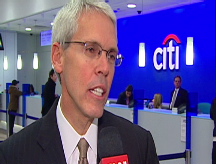Home prices in record decline
A Case-Shiller survey shows a 16.6% annual decline in the summer months as the housing picture continues to deteriorate.
| 30 yr fixed | 3.80% |
| 15 yr fixed | 3.20% |
| 5/1 ARM | 3.84% |
| 30 yr refi | 3.82% |
| 15 yr refi | 3.20% |
NEW YORK (CNNMoney.com) -- The home price plunge stayed on a record pace this summer, according to a widely watched gauge of national real-estate markets released Tuesday.
The S&P Case-Shiller Home Price national index recorded a 16.6% decline in the third quarter compared with the same period a year ago. That eclipsed the previous record of 15.1% set during the second quarter.
Prices in Case-Shiller's separate index of 10 major cities fell a record 18.6%, while its 20-city index dropped a record 17.4%
With foreclosures soaring at record rates, the economic picture dimming and job losses ramping up, all the elements were in place to push prices lower.
"The turmoil in the financial markets is placing further downward pressure on a housing market already weakened by its own fundamentals," said David Blitzer, Standard & Poor's spokesman for the indexes, in a press release. "All three aggregate indices, and 13 of the 20 metro areas, are reporting new record rates of decline...Prices are back to where they were in early 2004."
The 10-city index is now 23.4% off its peak price, which came in June 2006; the 20-city index is down 21.8% from its July 2006 high and the national index has fallen 21% since the third quarter of 2006.
Home prices in the 10-city index have fallen for 26 consecutive months. The decline has broadened over the past 12 months, with prices dropping in every city of the 20-city index during September.
In the weakest market, Phoenix, the 12-month loss came to 31.9%. Las Vegas prices plummeted 31.3% and San Francisco recorded a 29.5% decline. The best performing markets, Dallas and Charlotte, N.C., still posted drops - 2.7% in Dallas and 3.5% in Charlotte.
With San Francisco and Las Vegas, the other members of the 10-city index are: Miami, down 28.4% year-over-year; Los Angeles, down 27.6%; San Diego, down 26.3%; Washington, down 17%; Chicago, down 10.1%; New York, down 7.3%; Boston, down 5.7%; and Denver, down 5.4%.
In addition to Phoenix, Dallas, Charlotte and the cities in the 10-city index, the 20-city index is made up of: Detroit, down 18.6%); Tampa, Fla., down 18.5%; Minneapolis, down 14%; Seattle, down 9.8%; Atlanta, down 9.5%; Portland, Ore., down 8.6%; and Cleveland, down 6.4%.
Foreclosures continue to take a heavy toll, with sales in some cities dominated by properties repossessed by banks and then put back on the market, often at bargain prices. In Las Vegas and Cleveland, for example, about half of all homes for sale are bank-owned properties, according to the real estate Web site, Trulia.com.
"Foreclosures are clearly a part of the market now," said Blitzer.
He added that the national index price trends tend to be more moderate because they encompass many more exurban and rural areas, where, in many cases, home prices never skyrocketed as they did in some of the hotter, urban markets.
Karl Case, the Wellesley economics professor who is the Case in Case-Shiller, said during a news conference about the latest index report that he would hesitate to put a number on how much further prices could fall, but the increasing job losses will surely worsen the situation.
"There's no cushion against unemployment," he said.
And Pat Newport, an economist with Global Insight, pointed out that the latest numbers don't even capture the impact of some of the events of the past couple of months.
"The real economy took a sharp turn for the worse towards the end of the third quarter," he said. "Since then, housing permits are down, the National Association of Home Builders index of activity dropped to a record low in November and purchase loan applications were down 15%. That's telling us the housing market has worsened a lot."
Add to that a jumping unemployment rate and more bank woes and it portends lousy home price numbers for months to come, according to Newport.
"As bad as the latest Case-Shiller numbers appear to be, they are bound to get a lot worse," he said. ![]()



